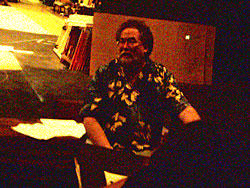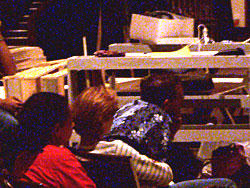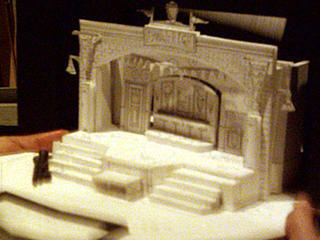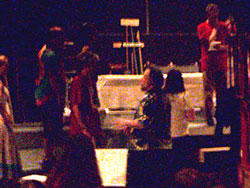John McIlwee, Director of University Theatre

When asked why he was so creative, John McIlwee commented that he hadn't given it much thought. He never really questioned the origins of inspirational creativity for himself. Although he feels that one is creative by birth, that it is intrinsic in nature to be instinctively creative, he reflected that he wasn't sure where it came from because his "parents had talents… just not much". This response really reminded me about the old argument of “nature vs. nurture”. Attributing his initial foray into the arts to a close mentor, John asserts the principle that Creativity is not a choice but more often is a lifestyle; he elaborated that his talent and creativity were refined through the development of an environment that supported and "nurtured the creative spirit". I found that this “push and pull” with the inner nature of the individual and the external influence from the environment could be balanced by utilizing some basic personality profiles and tests. By understanding how you learn and internally process the world as well as how you react and how others perceive, you can gain insight into your strengths and weaknesses when it comes to interpreting something new or approaching others when explaining something.

I find it fascinating that somehow with only a great interest in art, where no art or artistic channels were available, he managed to surround his life and work with creative outlets that kept his attention, challenged his skills and refined his personal outlook. I can relate to the regiment of learning the vocabulary and the technical proficiency of the craft as it becomes critical to the development of a mature creative path. I believe that it is through this maturity and understanding where one can be able to effectively communicate one's ideas and vision as clear as possible to those around you. Taking what is common to the field of endeavor yet building upon those foundations to be able to translate a set of requirement or to better describe your ideas using language from both fields of practice.

In line with Patrick Fitzgerald's philosophy, John emphasized that creativity isn't derived through analysis alone but is developed through routine and practice. The development of many iterations of design, without stopping to question each individual idea, is required to fully explore the nuances of a particular task or project. Although this task at first seems daunting I find it is helpful to first change something minor – color, shape, size, texture and then incrementally build up over time then by starting over with something completely different. Once you get into the routine of modifying a single design and cranking out ideas over and over you get into a focused frenzy, boxing out portions of the design, scribbling over ideas that were created or combining two separate ideas - where alone they would look simple but once merged together they look refined. Only through this practice can one explore both the mundane and the elaborate while displaying the myriad of choices available without settling for the norm. Once “complete” you have at your disposal a good assortment to choose from as well as an archive of the design process for which someone else can utilize or see where the idea evolved or was deconstructed down to its simplest form.

An idealist and perfectionist, John McIlwee stresses that he is dissatisfied with compromise. Understanding that no matter what the outcome is, it is the he alone that will get some form of blame, criticism or ridicule for the project as a whole. Therefore it is of importance, as the creative artist, to please oneself first while following through with strength and character – being both honest and true to the craft; telling the story from the heart and blocking anything else out in order to focus or lock into the vision. He recommends that you not be hindered by the rules of others so that you may envision, enact, and espouse in order to get your vision out.
 When asked why he was so creative, John McIlwee commented that he hadn't given it much thought. He never really questioned the origins of inspirational creativity for himself. Although he feels that one is creative by birth, that it is intrinsic in nature to be instinctively creative, he reflected that he wasn't sure where it came from because his "parents had talents… just not much". This response really reminded me about the old argument of “nature vs. nurture”. Attributing his initial foray into the arts to a close mentor, John asserts the principle that Creativity is not a choice but more often is a lifestyle; he elaborated that his talent and creativity were refined through the development of an environment that supported and "nurtured the creative spirit". I found that this “push and pull” with the inner nature of the individual and the external influence from the environment could be balanced by utilizing some basic personality profiles and tests. By understanding how you learn and internally process the world as well as how you react and how others perceive, you can gain insight into your strengths and weaknesses when it comes to interpreting something new or approaching others when explaining something.
When asked why he was so creative, John McIlwee commented that he hadn't given it much thought. He never really questioned the origins of inspirational creativity for himself. Although he feels that one is creative by birth, that it is intrinsic in nature to be instinctively creative, he reflected that he wasn't sure where it came from because his "parents had talents… just not much". This response really reminded me about the old argument of “nature vs. nurture”. Attributing his initial foray into the arts to a close mentor, John asserts the principle that Creativity is not a choice but more often is a lifestyle; he elaborated that his talent and creativity were refined through the development of an environment that supported and "nurtured the creative spirit". I found that this “push and pull” with the inner nature of the individual and the external influence from the environment could be balanced by utilizing some basic personality profiles and tests. By understanding how you learn and internally process the world as well as how you react and how others perceive, you can gain insight into your strengths and weaknesses when it comes to interpreting something new or approaching others when explaining something. I find it fascinating that somehow with only a great interest in art, where no art or artistic channels were available, he managed to surround his life and work with creative outlets that kept his attention, challenged his skills and refined his personal outlook. I can relate to the regiment of learning the vocabulary and the technical proficiency of the craft as it becomes critical to the development of a mature creative path. I believe that it is through this maturity and understanding where one can be able to effectively communicate one's ideas and vision as clear as possible to those around you. Taking what is common to the field of endeavor yet building upon those foundations to be able to translate a set of requirement or to better describe your ideas using language from both fields of practice.
I find it fascinating that somehow with only a great interest in art, where no art or artistic channels were available, he managed to surround his life and work with creative outlets that kept his attention, challenged his skills and refined his personal outlook. I can relate to the regiment of learning the vocabulary and the technical proficiency of the craft as it becomes critical to the development of a mature creative path. I believe that it is through this maturity and understanding where one can be able to effectively communicate one's ideas and vision as clear as possible to those around you. Taking what is common to the field of endeavor yet building upon those foundations to be able to translate a set of requirement or to better describe your ideas using language from both fields of practice. In line with Patrick Fitzgerald's philosophy, John emphasized that creativity isn't derived through analysis alone but is developed through routine and practice. The development of many iterations of design, without stopping to question each individual idea, is required to fully explore the nuances of a particular task or project. Although this task at first seems daunting I find it is helpful to first change something minor – color, shape, size, texture and then incrementally build up over time then by starting over with something completely different. Once you get into the routine of modifying a single design and cranking out ideas over and over you get into a focused frenzy, boxing out portions of the design, scribbling over ideas that were created or combining two separate ideas - where alone they would look simple but once merged together they look refined. Only through this practice can one explore both the mundane and the elaborate while displaying the myriad of choices available without settling for the norm. Once “complete” you have at your disposal a good assortment to choose from as well as an archive of the design process for which someone else can utilize or see where the idea evolved or was deconstructed down to its simplest form.
In line with Patrick Fitzgerald's philosophy, John emphasized that creativity isn't derived through analysis alone but is developed through routine and practice. The development of many iterations of design, without stopping to question each individual idea, is required to fully explore the nuances of a particular task or project. Although this task at first seems daunting I find it is helpful to first change something minor – color, shape, size, texture and then incrementally build up over time then by starting over with something completely different. Once you get into the routine of modifying a single design and cranking out ideas over and over you get into a focused frenzy, boxing out portions of the design, scribbling over ideas that were created or combining two separate ideas - where alone they would look simple but once merged together they look refined. Only through this practice can one explore both the mundane and the elaborate while displaying the myriad of choices available without settling for the norm. Once “complete” you have at your disposal a good assortment to choose from as well as an archive of the design process for which someone else can utilize or see where the idea evolved or was deconstructed down to its simplest form. An idealist and perfectionist, John McIlwee stresses that he is dissatisfied with compromise. Understanding that no matter what the outcome is, it is the he alone that will get some form of blame, criticism or ridicule for the project as a whole. Therefore it is of importance, as the creative artist, to please oneself first while following through with strength and character – being both honest and true to the craft; telling the story from the heart and blocking anything else out in order to focus or lock into the vision. He recommends that you not be hindered by the rules of others so that you may envision, enact, and espouse in order to get your vision out.
An idealist and perfectionist, John McIlwee stresses that he is dissatisfied with compromise. Understanding that no matter what the outcome is, it is the he alone that will get some form of blame, criticism or ridicule for the project as a whole. Therefore it is of importance, as the creative artist, to please oneself first while following through with strength and character – being both honest and true to the craft; telling the story from the heart and blocking anything else out in order to focus or lock into the vision. He recommends that you not be hindered by the rules of others so that you may envision, enact, and espouse in order to get your vision out.

0 Comments:
Post a Comment
<< Home